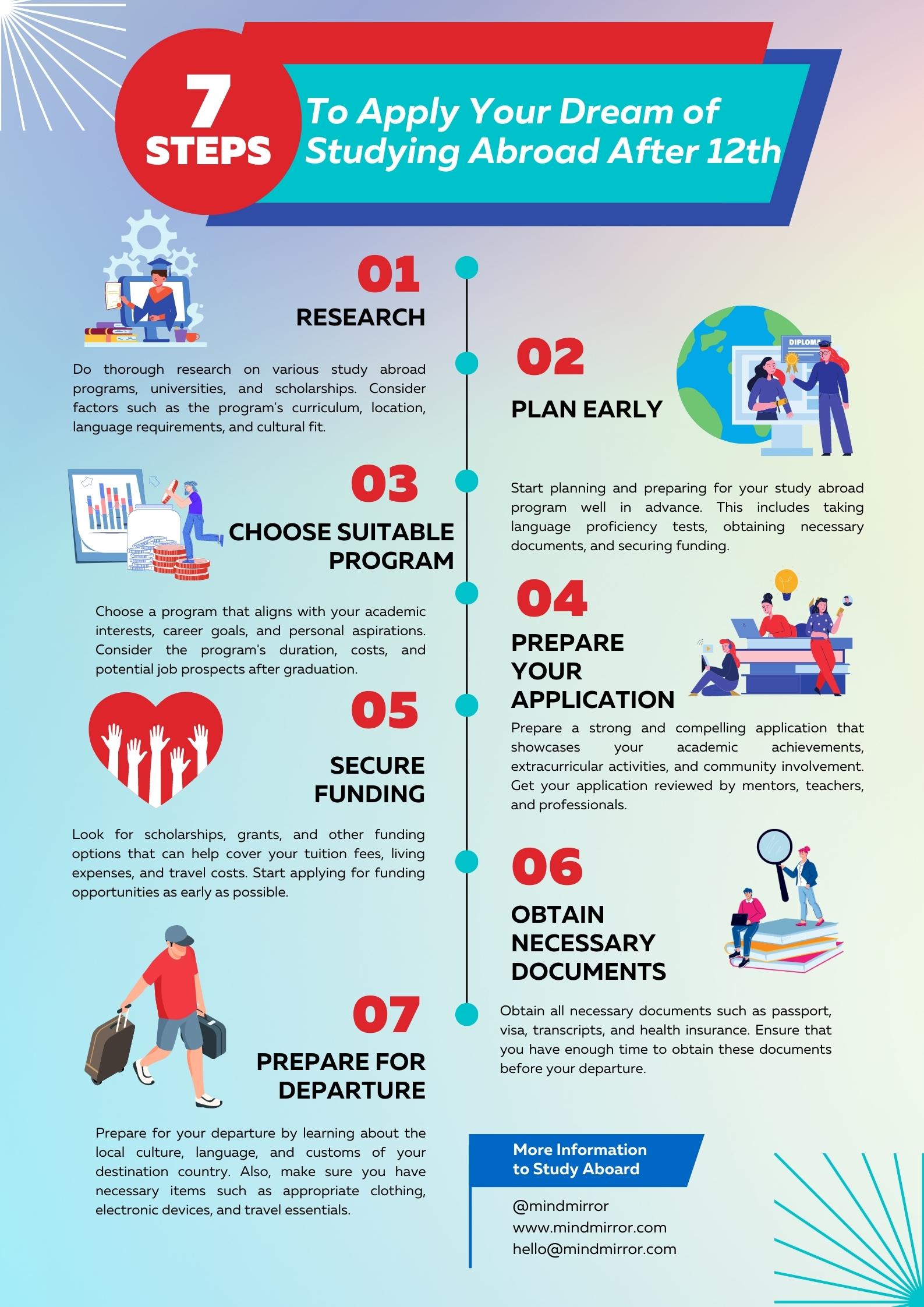Studying abroad has become increasingly popular among Indian students in recent years. Pursuing higher education abroad not only offers exposure to different cultures and teaching methodologies but also enhances the chances of career success. However, the process of applying to foreign universities can be overwhelming and confusing for students who have just completed their 12th standard in India. In this article, we will guide Indian students on how to study abroad after 12th and provide a comprehensive overview of the entire process.
Why study abroad after 12th?
Studying abroad after 12th can provide Indian students with a unique opportunity to gain exposure to different cultures, people, and perspectives. It can also help students broaden their academic horizons, develop valuable skills, and enhance their chances of career success. Additionally, studying abroad can be a life-changing experience that can help students grow personally, become more independent, and gain a global perspective.
Types of courses available for Indian students
Indian students can choose from a wide range of courses when studying abroad after 12th. Some of the popular courses include undergraduate and postgraduate programs in engineering, management, computer science, medicine, law, and social sciences. Students can also pursue diploma and certificate courses in areas such as culinary arts, fashion design, and animation.
Popular study abroad destinations for Indian students
Some of the popular study abroad destinations for Indian students after 12th include the United States, Canada, the United Kingdom, Australia, New Zealand, Germany, Singapore, and Dubai. Each of these countries offers different advantages, such as academic excellence, high-quality infrastructure, cultural diversity, and employment opportunities.
Eligibility criteria for studying abroad after 12th
To be eligible to study abroad after 12th, Indian students must meet certain academic and language proficiency requirements. Additionally, they may have to take entrance exams for certain courses and universities.
-
Academic requirements
Indian students who have completed their 12th standard in India must have a minimum of 50% to 60% marks, depending on the course and university they are applying to. Some universities may require higher scores, particularly for competitive courses such as medicine and engineering.
-
English language proficiency tests
Indian students must also demonstrate their proficiency in the English language by taking standardized tests such as TOEFL, IELTS, or PTE. The required scores may vary depending on the course and university.
-
Entrance exams
Many universities abroad require Indian students to take entrance exams such as SAT, ACT, GRE, or GMAT, depending on the course and university they are applying to.

How to choose a university and course?
Choosing the right university and course can be a challenging task for Indian students. To make an informed decision, students must consider various factors such as the location, reputation, academic offerings, faculty, cost of education, and employment opportunities. It is essential to research different universities and courses thoroughly and compare them based on these factors before making a final decision.
Application process for studying abroad after 12th
The application process for studying abroad after 12th can be lengthy and complex. Students must ensure that they meet all the eligibility criteria and gather all the necessary documents before starting the application process.
-
Documents Required
The documents required for the application process may include academic transcripts, English language proficiency test scores, entrance exam scores, letters of recommendation, personal statement, and financial documents.
-
Application deadlines
Different universities and courses may have different application deadlines. Students must keep track of these deadlines and submit their applications well before the deadline to avoid any last-minute rush.
Financing your education abroad
Studying abroad can be expensive, and Indian students may need to explore various financing options to fund their education. Some of the popular options include scholarships and grants, education loans, and personal savings.
-
Scholarships and grants
Many universities abroad offer scholarships and grants to international students, including Indian students. Students must research and apply for these scholarships well before the application deadline.
-
Education loans
Indian students can also avail of education loans from banks and financial institutions. Students must research the various loan options available and compare them based on interest rates, repayment terms, and other factors before choosing a loan.
Student visa process
Indian students must obtain a student visa to study abroad after 12th. The student visa process can vary depending on the country and the type of visa required.
-
Types of visas
Different countries may have different types of visas for international students, such as a study visa, a student exchange visa, or a work-study visa.
-
Documents required
The documents required for the student visa process may include a valid passport, admission letter from the university, financial documents, and health insurance.
Pre-departure preparations
Once the student visa is approved, Indian students must prepare for their journey to study abroad. Some of the essential pre-departure preparations include making travel and accommodation arrangements, purchasing health and travel insurance, and packing essentials.
-
Challenges faced by Indian students studying abroad after 12th
Studying abroad after 12th can be challenging for Indian students, as they may face cultural differences, homesickness, language barriers, and academic pressures. However, with the right mindset and support system, these challenges can be overcome.
Conclusion
Studying abroad after the 12th can be a life-changing experience for Indian students. It offers exposure to different cultures, academic opportunities, and career prospects. However, the process of applying for and preparing for studying abroad can be overwhelming. By following the guidelines provided in this article, Indian students can navigate the entire process with ease and make the most of their experience.
FAQ
- What are the benefits of studying abroad after 12th for Indian students?
Studying abroad after 12th offers Indian students an opportunity to experience a new culture, learn a new language, gain exposure to global perspectives, and enhance their employability by obtaining a foreign degree. - What are the eligibility criteria for Indian students to study abroad after 12th?
The eligibility criteria for studying abroad after 12th vary depending on the country and university. Generally, Indian students must have completed 12th standard or equivalent, meet the minimum academic requirements, and have a valid passport. - What are the popular destinations for Indian students to study abroad after 12th?
The popular destinations for Indian students to study abroad after 12th include the United States, United Kingdom, Canada, Australia, New Zealand, and Europe. - What are the language requirements for Indian students to study abroad after 12th?
The language requirements for studying abroad after 12th depends on the country and university. In some cases, Indian students may need to demonstrate proficiency in English or another language through standardized tests such as TOEFL or IELTS. - How can Indian students finance their studies abroad after 12th?
Indian students can finance their studies abroad after 12th through scholarships, grants, student loans, or personal savings. They can also explore part-time work opportunities while studying. - What are the visa requirements for Indian students to study abroad after 12th?
The visa requirements for Indian students to study abroad after 12th depending on the country and university. Generally, Indian students must obtain a student visa, which requires proof of acceptance into a recognized educational institution, sufficient financial resources, and a valid passport. - What are the entrance exams required for Indian students to study abroad after 12th?
The entrance exams are required for Indian students to study abroad after the 12th depending on the country and university. Common exams include SAT, ACT, GRE, GMAT, and language proficiency tests such as TOEFL or IELTS. - How can Indian students prepare for entrance exams required for studying abroad after 12th?
Indian students can prepare for entrance exams required for studying abroad after 12th by studying exam materials, taking practice tests, attending coaching classes, and seeking guidance from education consultants. - What are the cultural differences that Indian students may encounter while studying abroad after 12th?
Indian students may encounter cultural differences such as language barriers, different social norms and values, differences in food and lifestyle, and varying attitudes towards education and work. - How can Indian students make the most of their study abroad experience after 12th?
Indian students can make the most of their study abroad experience after 12th by immersing themselves in the local culture, making friends with people from different backgrounds, exploring the country and its attractions, and taking advantage of academic and career opportunities.




